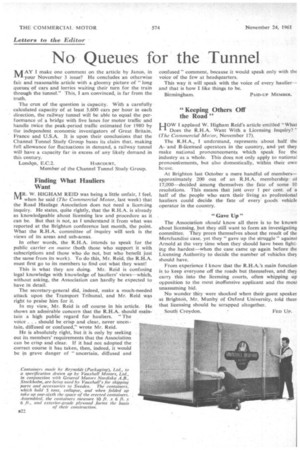No Queues for the Tunnel
Page 56

If you've noticed an error in this article please click here to report it so we can fix it.
J4AY I make one comment on the article by Janus, in your November 3 issue? He concludes an otherwise fair and reasonable article with a gloomy picture of "long queues of cars and lorries waiting their turn for the train through the tunnel." This, I am convinced, is far from the truth.
The crux of the question is capacity. With a carefully calculated capacity of at least 3,600 cars per hour in each direction, the railway tunnel will be able to equal the performance of a bridge with five lanes for motor traffic and handle twice the peak-period traffic estimated for 1980 by the independent economic investigators of Great Britain, France and U.S.A. It is upon their conclusions that the Channel Tunnel Study Group bases its claim that, making full allowance for fluctuations in demand, a railway tunnel will have a capacity far in excess of any likely demand in this century.
London, E.C.2. HARCOURT,
Member of the Channel Tunnel Study Group.
Finding What Hauliers Want
MR. W. HIGHAM REID was being a little unfair, I feel, when he said (The Commercial Motor, last week) that the Road Haulage Association does not need a licensing inquiry. He states, quite rightly, that the R.H.A. is already as knowledgeable about licensing law and procedure as it can be. But that is not, as I understand it from what was reported at the Brighton conference last month, the point.
What the R.H.A. committee of inquiry will seek is the views of its areas and sub-areas.
In other words, the R.H.A. intends to speak for the public carrier en masse (both those who support it with subscriptions and those who do not, but who benefit just the same from its work). To do this, Mr. Reid, the R.H.A. must first go to its members to find out what they want?
This is what they are doing. Mr. Reid is confusing legal knowledge with knowledge of hauliers' views—which, without asking, the Association can hardly be expected to have in detail.
The secretary-general did, indeed, make a much-needed attack upon the Transport Tribunal, and Mr. Reid was right to praise him for it.
In my view, Mr. Reid is off course in his article. He shows an admirable concern that the R.H.A. should maintain a high public regard for hauliers, "The voice . .. should be crisp and clear, never uncertain, diffused or confused," wrote Mr. Reid.
He is absolutely right, but it is only by seeking out its members' requirements that the Association can be crisp and clear. If it had not adopted the correct course it has taken, then, indeed, it would be in grave danger of "uncertain, diffused and confused" comment, because it would speak only with the voice of the few at headquarters.
This way it will speak with the voice of every haulier— and that is how I like things to be.
Birmingham. PAID-UP MEMBER.
"Keeping Others Off the Road"
J..40w I applaud W. Higharn Reid's article entitled "What Does the R.H.A. Want With a Licensing Inquiry? (The Commercial Motor, November 17).
The R.H.A., I understand, represents about half the A-and B-licensed operators in the country, and yet they make national pronouncements which speak for the industry as a whole. This does not only apply to national pronountements, but also domestically, within their own hcuse.
At Brighton last October a mere handful of members— approximately 200 out of an R.H.A. membership ol 17,000—decided among themselves the fate of some 10 resolutions. This means that just over 1 per cent. of a half of the people who earn their living as professional hauliers could decide the fate of every" goods vehicle operator in the country.
"Gave Up" The Association should know all there is to be known about licensing, but they still want to form an investigating committee. They preen themselves about the result of the Merchandise case, yet they " gave up the struggle" againsi Arnold at the very time when they should have been fighting the hardest—when the case came up again before the Licensing Authority to decide the number of vehicles they should have.
From experience I know that the R.H.A.'s main function is to keep everyone off the roads but themselves, and they carry this into the licensing courts, often whipping up opposition to the most inoffensive applicant and the mos1 unassuming bid.
No wonder they were shocked when their guest speaker at Brighton, Mr, Munby of Oxford University, told them that licensing should be scrapped altogether.
South Croydon. FED Up.




















































































































